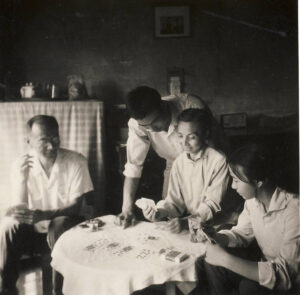A Family, A Game, A Legacy
(Original Title: Bridge is 橋)
Yan Shen Drabek
January 1, 2025
My father learned the game in 1945. That year, he graduated with a degree in English from Central University of China, and found a job as a translator for the U.S. Information Service Agency in Chong Qing, the war capital city of China during WWII. He learned to play rubber bridge from the American military personnel in the agency. From 1947 to 1949, he was a special correspondent for the newspaper of Shanghai News in Nanking, the capital city of China after WWII. His job was to report daily news announcements in Nanking. During waiting times at the press office, he played bridge with other journalists from around the world who were also waiting there.
Growing up in China, bridge playing time at our home was treasured holiday times. It usually happened after a sumptuous meal cooked by mother. Then she would put a nice blanket on our square wooden table, my brothers and I would put on our best behaviors and all seated seriously at the table. Father was the king at the table. The way he called for an “Ace”, in English with a little American accent, still echoes in my ears! The five of us rotated to play at the table. I asked father what to do whenever I didn’t know what to do. I did not understand much about conventions or scoring, but father installed in me some card sense and manners at the table.
Then it came the political turmoil times in China in the 60s and 70s. My father was locked up and we were sent far away for “re-education” during the “Culture Revolution”. I remember the last time we played bridge at home. It was a weekend and my mother had been ill for sometime. Father was allowed to come home for a visit, my oldest brother and I managed to come home from our re-education villages for a family reunion. By this time, we were forced by the Red Guards to relocate to live in two very small rooms and no longer had our wooden square table. We played on a small round table, sitting on stools. As you can see in the picture, mother still put on a table cloth for the occasion. It was one of the sweetest times we were together.

Father taught me the meaning of “bridge”. In Chinese, the character is “橋”(pronounced Chiao). A 橋 connects two places together, especially cross a river or a valley. In the game of bridge, a 橋 connects cards in your hand and cards on the table. You should always remember to build a 橋 and keep it open so you can walk back and forth smoothly.
New teachers I run into these days use the word “transportation”. I like my father’s explanation better because it is more closely linked to the “bridge” experience.
* This article was published on BBO's Weekly News on February 4, 2025. My Original Title was Bridge is 橋. The editor changed it to A Family, A Game, A Legacy.
Editor's note:
In this week’s reader story, Yan reflects on the bond that bridge created within their family. Bridge was a cherished tradition, and the family would often gather at the kitchen table to play after meals. Even during the Chinese Cultural Revolution, when they were separated and facing difficult conditions, bridge remained as a shared passion. Yan’s father not only taught them the game but also a deeper lesson—the fact that “bridge - 橋” symbolizes connection.
(posted on https://news.bridgebase.com/2025/01/14/a-family-a-game-a-legacy/?lid=as2mopdxh8ua )
From Google Translate:
我的父亲在 1945 年学会了打桥牌。那一年,他毕业于中央大学英语系,随后在美国新闻服务处找到了一份翻译的工作,该处位于二战期间的中国战都重庆。他从该处美国军人那里学会了打桥牌。1947 年至 1949 年,他是《上海新闻报》驻南京的特派记者,南京是二战后的中国首都。他的工作是报道南京的每日新闻。在新闻办公室等候的时间,他和来自世界各地的其他记者一起打桥牌。
我在中国长大,打桥牌是我们家珍贵的假日时光。通常是在母亲做了一顿丰盛的饭菜之后。然后,她会在我们的方形木桌上铺上一条漂亮的毯子,我和我的兄弟们会摆出最好的举止,严肃地坐在桌边。父亲是餐桌上的国王。他喊“Ace”的语气,带着一点美国口音,至今还萦绕在我的耳边!我们五个人轮流在牌桌上玩牌。每当我不知道该怎么做时,我都会问父亲该怎么做。我不太懂规则或计分,但父亲教会了我一些牌感和牌桌上的礼仪。
随后,中国进入了 60 年代和 70 年代的政治动荡时期。“文化大革命”期间,我父亲被关起来,我们被送往很远的地方接受“再教育”。我记得我们最后一次在家打桥牌。那是一个周末,我母亲已经病了一段时间。父亲被允许回家探望,我和大哥设法从再教育村回家团聚。这时,我们已經被红卫兵强迫搬到两个非常小的房间里居住,不再有我们的木制方桌。我们在一张小圆桌上玩耍,坐在凳子上。正如你在照片中看到的,母亲仍然为这次活动铺了桌布。这是我们在一起最甜蜜的时光之一。
父亲教我“桥”的含义。中文里,“Bridge”这个字是“桥”。桥连接两个地方,尤其是跨过河流或山谷。在桥牌游戏中,桥连接手中的牌和桌上的牌。你应该始终记住搭桥并保持桥的开放,这样你才能顺利地来回走动。
最近我遇到的新老师都用了“交通”这个词。我更喜欢我父亲的解释,因为它与“桥梁”的经验更紧密相关。